- Home
- Lindsay Buroker
Shockwave Page 8
Shockwave Read online
Page 8
He looked up Friedrich, but the first hit was an obituary. Casmir closed his eyes and dropped his face to his fist. He didn’t need to scan the news stories to know what had happened. That man had given his life so Casmir would have time to escape.
But why?
“Customs is waving us through,” came Lopez’s relieved voice over a speaker. “We’ll be on the loop in twenty minutes.”
“Definitely a smuggler,” Kim said, meeting Casmir’s gaze, her contacts also flickering faintly with images from news feeds. “Does it bother you that we don’t know where she’s taking us?”
“I don’t think she knows where she’s taking us.”
“Is that supposed to be reassuring?”
“Perhaps not. Would you like a hug?”
“You know my feelings on touching.”
Casmir smiled. “Do you perplex your father and brothers as much as I suspect?”
He’d met her family. Her father, Haruto Sato, was a friendly, garrulous man who taught kendo and maintained the Shinto shrine in his neighborhood, leading weekly worship sessions for the community. Her half-brothers were also chatty and full of easy smiles.
“My brothers, a bit. My father just smiles understandingly and says I’m like my mother.” Her mouth twisted with something bordering on distaste.
“You disagree?”
Kim shrugged. “I don’t know her that well. She’s always been gone on some archaeological exploration or another, trying to solve the mystery of the gate system and who built it. She’s been all over the Twelve Systems. When I was a kid, I thought it was exciting and romantic and wanted to go with her.” She looked out the porthole, but it was the middle of the night, and they were circling and waiting for their turn, so there wasn’t much to see. “When I got older, I mostly wondered why she was never home. Why she’d bothered to have a kid if she was never going to be there to do anything with me.”
“Was she flesh-and-blood when you were born?” In their previous chats regarding families, Casmir had always gotten the impression of a distant mother who hadn’t quite been human even when Kim was growing up.
She shook her head. “Apparently, I was conceived ten years before I was born, before my parents split up, but she was busy with her career, so she had the embryo removed and suspended for later. Then she contracted a rare bacterial infection while on some water world that turned out to have life native to the system under the ice. Humans hadn’t known about it prior to that and didn’t know how to kill it. It was fascinating.”
“Your suspended-embryo-self thought that?”
She shot him a dirty look. “I studied it later. When I was old enough to be interested in bacteria and the medical field.”
“So, like ten?”
“I was seven, actually, when I first started studying the bacteria that killed her. Her body. The bacteria didn’t pass the blood-brain barrier, so she was fully compos mentis when she uploaded her brain into her new… robot body. I guess you can’t call it an android when it’s only thirty pounds and has fur.”
“Ah.” Casmir had wondered if the woman might have been mentally compromised when she’d made that decision. “It’s a monkey body, isn’t it?”
“Don’t remind me. She’s weird.”
“And your father says you’re like her?”
“Kind of him, isn’t it?”
Casmir scratched his jaw. “Maybe he means it to be. He doesn’t seem like the type to insult people.”
“I suppose not. Like I said, I never got to know her well. She once admitted that when she was dying, she regretted not having had her baby. That’s why she rented an artificial womb and decided to have me even though she wasn’t human anymore. Kingdom law forbade it—and my father was stunned that she wanted that, since they’d broken up years before—so she had me on Zhizhu Station in System Hind. I lived there with her until I was three, but her colleagues interested her in some new find, and she brought me back to live with my father, so she could go off cavorting around the galaxy. She visits some but…” She shrugged again.
Casmir thought that was as much as she would reveal—it was more than she’d ever told him before—but she spoke again.
“I should be over it by now, shouldn’t I? I turned thirty-one last month, after all.”
“Yes, I remember the celebratory wine.” He smiled and waved a hand. “I guess, be glad that you’ve got your father and half-brothers, right?”
She spread her hand. “They are accepting, but you’re the only one who doesn’t think I’m odd.”
He grinned. “Have you seen some of the people I work with? Wickmayer makes you answer trivia questions about spaceships before he’ll talk to you. Chang only eats green foods. Simon writes love poems about prime numbers. Or maybe to prime numbers. You’re one of the most normal people I know.”
“I think that means you’re a magnet for odd people, not that I’m normal.”
“This is possible. But hey, other than the mother-in-a-monkey-body, I don’t know if your background would be considered that unusual in the rest of the systems. They say you can find everything from marriages between twenty people to humans engineered to have both sex parts to people giving genius brains to their dogs and marrying them.” Casmir didn’t think he was the typical conservative Kingdom subject, but he wasn’t quite open-minded enough not to find some of that strange. “And you know I can’t judge the circumstances of anyone’s birth when I don’t know my own.”
He was still floored by the idea that his true mother might be alive somewhere—and care enough to warn him about danger. Maybe. If she’d truly cared about him, why hadn’t she ever come and seen him?
“So your mother could also be a monkey, and you just don’t know it yet,” Kim said.
“Exactly. Perhaps we could set up a mathematical experiment later to calculate the probabilities.”
“Pod up, passengers,” Lopez said over the comm. “We’re up next.”
“Off to see the odd rest of the galaxy,” Casmir murmured as the ship shifted slightly and a ker-chunk emanated from somewhere below them. He could no longer see the launch loop from their porthole, so he assumed they were on it.
“What will the appropriate response be if we meet someone married to their dog?” Kim asked.
“I’m not worldly enough—galactic enough—to tell you.”
His pod tightened automatically, a shield coming down to protect his head and padding molding to and pressing against his face. A surge of claustrophobia rushed through him. He sucked in a big breath, fear of being suffocated rearing within him. But he found he could breathe through the padding. And even see somewhat.
He had the sense of the ship moving along the tracks, but it was some time before he felt what had to be their acceleration. There was nothing to see out the porthole, which was good because his view of it was poor now. They climbed into the sky, fifty miles and more, then leveled off and shot along the track stretching high above the ocean, picking up speed with each passing second.
A slight feeling of pressure touched his chest but nothing like the three times Odin’s gravity that he’d expected. He closed his eyes, waiting for the ship to escape the atmosphere and for his journey to truly begin.
“Another ship got onto the tracks right behind us,” came Lopez’s voice over the speaker, a little muffled by her own pod.
Casmir wanted to ask if that was typical or if they had something to worry about, but he simply closed his eyes and held on.
6
Dr. Yas Peshlakai paced next to the airlock, his medical bag in hand, his magnetic boots clanging faintly on the smooth metal deck of Captain Rache’s ship, the Fedallah.
Usually, the vessel’s spin gave it almost as much gravity as his home—his former home—on Tiamat Station, but it was stationary now, just outside the gravity well of the gas giant Saga and docked to Saga Kingdom Refinery Number 1. It was the first of two refineries the pirates—or respectable mercenaries, as the crew had often assured Yas
they were during the last three months—had supposedly been hired to blow up.
He had no idea if any digital money would exchange bank accounts. From what he’d seen of Rache so far, the captain pillaged from Kingdom ships and stations at whim, leaving piles of dead bodies behind whenever he attacked. Military warships sent after him were either destroyed or simply never found him. Vessels from the rest of the systems did their best to avoid him.
At least the refineries were unmanned, automated robots and machinery the only possible recipients of the mercenaries’ DEW-Tek bolts and explosives.
Yas shook his head, trying not to think about how he’d promised to do his best to keep these people alive for five years. Four years, nine months, and three days, now. Numerous times, he’d been tempted to go back on his word, to escape at the first chance, even wondering if the pirate captain might have set everything up that eventful night in order to acquire Yas as a doctor. But at the few ports they’d visited, Rache hadn’t given Yas any chances to wander off on his own. Besides, Yas didn’t have anywhere to go. According to all the news articles written about President Bakas’s death, he had done it. He’d poisoned her and then run, proving his guilt. And now there was a bounty out for him, wanted alive or dead.
If Yas had remained on Tiamat Station, or even in the same system, maybe he could have hunted for the true murderer and tried to clear his name, but how could he do that from a hundred light years away? In five years, when his term with Rache was up, would anybody still care about President Bakas’s death? Would there be any clues left to follow then?
A yellow light on the airlock control panel flashed, and the hatch hissed as it opened.
“Out of the way, Doc,” one of the mercenary sergeants growled, stomping through the hatchway in full combat armor, a helmet shrouding his features.
He and the man behind him carried a pair of large cylindrical tanks that barely fit inside the airlock chamber. Yas stepped to the side to make room.
“Where’s the captain? I saw that he was injured.” Yas flicked a finger toward the display in the bulkhead. It showed Lieutenant Moon’s camera feed as he walked next to Rache and several other men.
“Don’t worry, Doc. If the captain dies, we’ll let you live. You’ve got uses, even if you won’t pick up a gun.” The sergeant patted him on the shoulder as he stepped into the corridor. Actually, it was more of a punch.
Yas braced himself, not fazed by the abuse from the mercenaries. He’d suffered worse on the various sport teams he’d played on in his youth. What fazed him was that his life had gone to shit, and he was stuck out here with these ignorant jackasses, working for a man who’d made a career of killing people. What had he done to deserve this?
“Here, Doc,” the corporal who stepped out behind the sergeant said. “Make yourself useful until we bring you someone to patch up.”
He and the sergeant thrust the tanks at him. Yas juggled his medical kit so he could catch them, glad for the non-existent gravity.
“What are these?” Yas asked.
“What do you think they are, Dr. Genius?” The sergeant laughed as he and the corporal headed back into the airlock.
“Helium? We’re stealing from the refinery?” Even as he objected, Yas realized how silly it sounded. Why not take some of the valuable gas before they blew it out of Saga’s orbit?
“We’re salvaging fuel from a wreck.”
“It’s not a wreck. It’s a—”
“Oh, it’ll be a wreck in about five minutes. What are you? One of King Jager’s knights? We don’t need any moral righteousness out here. Besides, we’re making it easy on everyone. Merc ships need gas, the same as anyone else, but people get a little nervous when we show up at their fuel station. We—” The sergeant’s helmet spun. “Shit. Cycle the lock, Varma.”
The hatch clanged shut in front of Yas, and the light on the control panel flashed again. Yas looked toward the display.
Before, still, dark rooms full of machinery and tanks had stretched ahead of the main force. Now, huge boxy security robots with thrusters jetted toward Rache’s team. Lieutenant Moon’s helmet cam had provided a stable feed, but now, it jerked dizzily as he and the others ran for cover, firing at their mechanical enemies. Mechanical enemies that fired back, defending the refinery.
A shot struck one of the men in the shoulder, and his boots came free of the deck. He started to float away in the zero-gravity environment, but one of the other mercenaries grabbed him and pulled him back down. He was the smallest of the group, and Yas recognized him even though they all wore the featureless helmets and black armor.
Captain Rache.
He fired a grenade launcher toward the charging robot defenders. It detonated when it clanged off, and light flashed, the effect underwhelming in zero gravity. Six androids jetted down from above, landing in the middle of the mercs.
The captain spun and leaped at one with cybernetically enhanced speed and strength. He punched, thrusting one android into a tank, but another lunged in and wrapped powerful arms around his torso. Rache drove an elbow into his foe’s chest, ducking and twisting free. A lightning-fast kick hurled the android toward the approaching robots. It bounced off, twisting to stop its momentum and jet back into the fray.
The lieutenant’s helmet jerked and jumped as an android grabbed him and shook him. Yas looked away from the display, the battle too confusing to follow like that.
He tapped the chest controls on his suit. His helmet unfolded from its slot between his shoulders, spread over his head, and snapped to the rest of his suit. That gave him access to the combat channel. And a lot of cursing.
“…weren’t supposed to be this many defenses!”
“We’re fucked.”
“The captain was shot!”
Yas bit his lip. Should he go over there and try to help? He started to push a hand through his hair, but his fingers bumped the thin, nearly impervious Glasnax of his helmet. He didn’t have any weapons, and nothing in his medkit would stop robots or androids.
“Look out, sir!” someone cried.
A tangle of curses came from several mouths.
Yas closed his eyes, waiting for the comm ordering him to come help Rache. Or maybe a comm saying it was too late to help Rache.
It was selfish, but Yas’s main concern was what these mercenaries would do to him if the captain died. He hadn’t won a lot of friends thus far, refusing to engage the thuggish brutes in conversation. Few of them had educations or followed the news, and their favorite topics were excrement, masturbation, and how many women they were going to bang during their next shore leave.
Rache was different, with a cultured way of speaking and a tendency to reference classic books and recent articles on science and technology, but he didn’t deign to converse with Yas or anyone else often. To call him a companion would be a grave presumption. He was the leader of the ship, and that was it. His presence ended arguments whenever he entered a room, and Yas had little doubt that he was the sole reason any order existed among the rough mercenaries.
Someone’s scream echoed through the helmet speaker, and the audio feed ended abruptly. The display on the wall went black.
Yas stared at the hatch, wondering if anyone would make it back.
“Bridge?” Yas asked, switching to the ship’s internal comm channel. “Are they still alive over there?”
“Shit, Doc, that you? Cowering in the corridor instead of over there helping them?”
“The captain told me to stay here.”
The comm officer grunted and didn’t respond. Or give an update.
Yas was on the verge of going up to the bridge when the airlock light flashed again. Still holding the tanks, if only to keep them from floating away, he stepped out of the way.
“Dodger,” the captain’s voice sounded over the channel, ridiculously calm. “We’re cycling in. Get ready to depart. Quickly. We’ve set timed charges.”
“Understood, Captain,” the ship’s pilot said.
&n
bsp; The hatch swung open, and the first six men in the boarding party strode out.
“Doc, I got a hangnail,” one announced. “Need you to fix it.”
The man behind him punched him. “Moon’s dead. Shut your hole.”
“Mercs die. That’s how it is. Ought to kiss the captain’s ass that it doesn’t happen that often on this ship.”
The men strode past, ignoring Yas, nobody offering to take the tanks. The hatch shut automatically so the airlock could cycle for the second half of the team.
“If you need help,” Yas called after them, “head to sickbay. I’ll be there shortly.”
Nobody acknowledged him.
When the hatch opened again, the captain strode out with four more men. One less than had gone over. Skin and blood showed through a hole in the captain’s armor. Yas gaped, wondering what had struck him that could pierce the strong alloy.
“Pod up,” the captain ordered his men. “We’re not sticking around to watch the fireworks.”
Several curt renditions of “Yes, sir” sounded, and his men strode away.
“Chief,” Rache said over the ship channel, “got some fuel here for you to pick up.”
Chief Engineer Khonsari’s distracted, “Yes, sir,” came in response.
“Lieutenant Moon?” Yas asked when only he and the captain remained in the corridor.
“A round blew his head off,” Rache said matter-of-factly. “Even you couldn’t have saved him.”
“Was it worth it?” Yas looked at the captain’s injured shoulder and waved for him to head to sickbay.
Rache didn’t move. His voice turned uncharacteristically savage when he said, “It’s always worth it to strike against the Kingdom. I am noting for the future that Jager has drastically increased security in his unmanned refineries. He must have been expecting trouble. We shouldn’t have lost anyone on a job like this.” His jaw might have clenched inside the helmet. He definitely sounded pissed. Because he cared about losing a man? Or was he merely irked that he’d made a mistake and lost one of the pawns on his chess board?

 Beneath the Surface
Beneath the Surface Dark Currents
Dark Currents The Dragon Blood Collection, Books 1-3
The Dragon Blood Collection, Books 1-3![Hunted [The Flash Gold Chronicles] Read online](http://i1.bookreadfree.com/16/hunted_[the_flash_gold_chronicles]_preview.jpg) Hunted [The Flash Gold Chronicles]
Hunted [The Flash Gold Chronicles]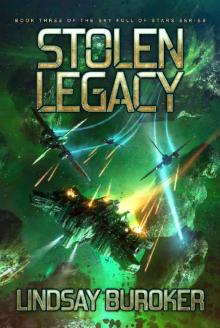 Stolen Legacy
Stolen Legacy Snake Heart
Snake Heart Shattered Past
Shattered Past Star Nomad
Star Nomad Patterns in the Dark
Patterns in the Dark Torrent
Torrent The Rogue Prince
The Rogue Prince Forged in Blood II
Forged in Blood II Liberty
Liberty The Fowl Proposal Bonus Scenes
The Fowl Proposal Bonus Scenes Forged in Blood I
Forged in Blood I Soulblade
Soulblade Perilous Hunt
Perilous Hunt 05 Dragon Blood: The Blade's Memory
05 Dragon Blood: The Blade's Memory Dragon Storm
Dragon Storm The Goblin Brothers Adventures
The Goblin Brothers Adventures Republic
Republic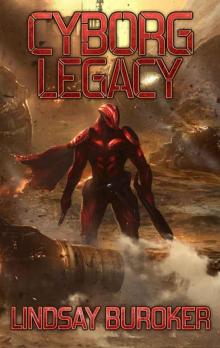 Cyborg Legacy
Cyborg Legacy Origins
Origins Beginnings: Five Heroic Fantasy Adventure Novels
Beginnings: Five Heroic Fantasy Adventure Novels Warrior Mage
Warrior Mage Swords and Salt - the Complete Series
Swords and Salt - the Complete Series 6.0 - Raptor
6.0 - Raptor Destiny Unchosen
Destiny Unchosen Balanced on the Blade's Edge
Balanced on the Blade's Edge Elven Doom (Death Before Dragons Book 4)
Elven Doom (Death Before Dragons Book 4)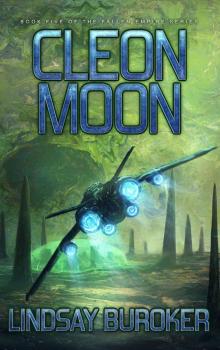 Cleon Moon
Cleon Moon Oaths (Dragon Blood, Book 8)
Oaths (Dragon Blood, Book 8) Crossfire (Star Kingdom Book 4)
Crossfire (Star Kingdom Book 4) Dragon Tear (Agents of the Crown Book 5)
Dragon Tear (Agents of the Crown Book 5) Encrypted
Encrypted Flash Gold
Flash Gold Enigma
Enigma_preview.jpg) Shadows Over Innocence (an Emperor's Edge short story)
Shadows Over Innocence (an Emperor's Edge short story) Decrypted
Decrypted Mist and Magic
Mist and Magic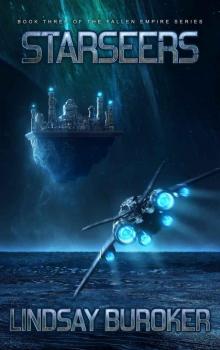 Starseers
Starseers Relic of Sorrows
Relic of Sorrows Blood and Betrayal
Blood and Betrayal Diplomats and Fugitives
Diplomats and Fugitives_preview.jpg) Balanced on the Blade's Edge (Dragon Blood, Book 1)
Balanced on the Blade's Edge (Dragon Blood, Book 1) The Emperor's Edge, no. 1
The Emperor's Edge, no. 1 Gold Dragon
Gold Dragon Duty Bound
Duty Bound Secrets of the Sword 2 (Death Before Dragons Book 8)
Secrets of the Sword 2 (Death Before Dragons Book 8) Peacemaker
Peacemaker Short Stories from the Star Kingdom
Short Stories from the Star Kingdom Shockwave
Shockwave Degrees of Delusion
Degrees of Delusion Assassin's Bond (Chains of Honor, Book 3)
Assassin's Bond (Chains of Honor, Book 3)_preview.jpg) The Emperor's Edge (a high fantasy mystery in an era of steam)
The Emperor's Edge (a high fantasy mystery in an era of steam)_preview.jpg) Solstice Day Gifts (an Emperor's Edge Short Story)
Solstice Day Gifts (an Emperor's Edge Short Story) Fractured Stars
Fractured Stars Honor's Flight
Honor's Flight Eye of Truth
Eye of Truth Arkadian Skies
Arkadian Skies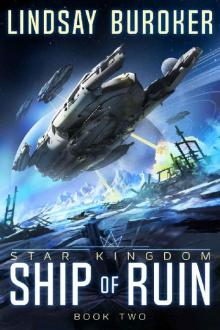 Ship of Ruin
Ship of Ruin Unraveled
Unraveled Blood Ties
Blood Ties Great Chief
Great Chief End Game
End Game Conspiracy
Conspiracy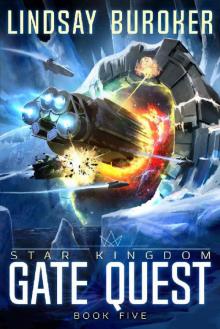 Gate Quest (Star Kingdom Book 5)
Gate Quest (Star Kingdom Book 5) Claimed
Claimed Under the Ice Blades
Under the Ice Blades Hero Code
Hero Code Battle Bond: An Urban Fantasy Dragon Series (Death Before Dragons Book 2)
Battle Bond: An Urban Fantasy Dragon Series (Death Before Dragons Book 2) Blood Charged
Blood Charged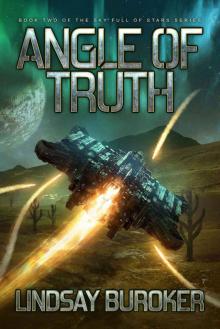 Angle of Truth
Angle of Truth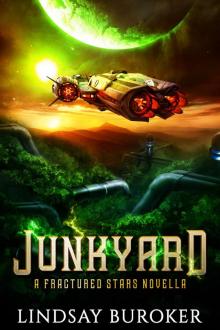 Junkyard
Junkyard Agents of the Crown- The Complete Series
Agents of the Crown- The Complete Series Planet Killer (Star Kingdom Book 6)
Planet Killer (Star Kingdom Book 6) Shadows Over Innocence
Shadows Over Innocence Forged in Blood I ee-6
Forged in Blood I ee-6 Sinister Magic: An Urban Fantasy Dragon Series (Death Before Dragons Book 1)
Sinister Magic: An Urban Fantasy Dragon Series (Death Before Dragons Book 1) Blood and Betrayal (The Emperor's Edge Book 5)
Blood and Betrayal (The Emperor's Edge Book 5) Smuggler Ship
Smuggler Ship The Rogue Prince (Sky Full of Stars, Book 1)
The Rogue Prince (Sky Full of Stars, Book 1) The Emperor's Edge (a high fantasy adventure in an era of steam)
The Emperor's Edge (a high fantasy adventure in an era of steam) Great Chief (Chains of Honor, Book 4)
Great Chief (Chains of Honor, Book 4) Hunted fgc-2
Hunted fgc-2 Shadows Over Innocence (emperor's edge)
Shadows Over Innocence (emperor's edge)![[Fallen Empire 00.5 - 03.0] Star Nomad Honor's Flight Starfall Station Starseers Last Command Read online](http://i1.bookreadfree.com/i/03/22/fallen_empire_00_5_-_03_0_star_nomad_hon_starfall_station_starseers_last_command_preview.jpg) [Fallen Empire 00.5 - 03.0] Star Nomad Honor's Flight Starfall Station Starseers Last Command
[Fallen Empire 00.5 - 03.0] Star Nomad Honor's Flight Starfall Station Starseers Last Command Arkadian Skies: Fallen Empire, Book 6
Arkadian Skies: Fallen Empire, Book 6 Enigma (emperor's edge)
Enigma (emperor's edge) Diplomats and Fugitives (The Emperor's Edge Book 9)
Diplomats and Fugitives (The Emperor's Edge Book 9) The Emperor's edge tee-1
The Emperor's edge tee-1 Liberty (Flash Gold, #5)
Liberty (Flash Gold, #5) Starseers: Fallen Empire, Book 3
Starseers: Fallen Empire, Book 3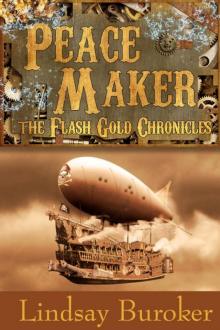 Peacemaker fgc-3
Peacemaker fgc-3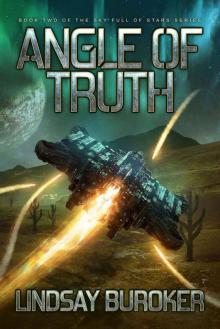 Angle of Truth (Sky Full of Stars, Book 2)
Angle of Truth (Sky Full of Stars, Book 2) Perilous Hunt: Fallen Empire, Book 7
Perilous Hunt: Fallen Empire, Book 7 Ice Cracker II (emperor's edge)
Ice Cracker II (emperor's edge) Conspiracy (The Emperor's Edge Book 4)
Conspiracy (The Emperor's Edge Book 4) Decrypted (Encrypted #2)
Decrypted (Encrypted #2) Forgotten Ages (The Complete Series)
Forgotten Ages (The Complete Series) You Are Here: Tales of Cartographic Wonders
You Are Here: Tales of Cartographic Wonders Duty Bound (Agents of the Crown Book 3)
Duty Bound (Agents of the Crown Book 3) Snake Heart (Chains of Honor Book 2)
Snake Heart (Chains of Honor Book 2) Conspiracy ee-4
Conspiracy ee-4 Flash Gold fgc-1
Flash Gold fgc-1 Fallen Empire 1: Star Nomad
Fallen Empire 1: Star Nomad Claimed (The Flash Gold Chronicles, #4)
Claimed (The Flash Gold Chronicles, #4) Ice Cracker II (and other short stories) (The Emperor's Edge)
Ice Cracker II (and other short stories) (The Emperor's Edge) Fallen Empire 2: Honor's Flight
Fallen Empire 2: Honor's Flight Gold Dragon (Heritage of Power Book 5)
Gold Dragon (Heritage of Power Book 5) Encrypted (the emperor's edge)
Encrypted (the emperor's edge)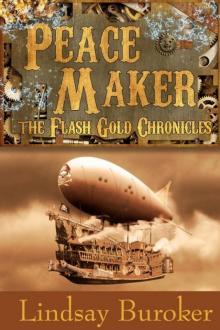 Peacemaker (The Flash Gold Chronicles, #3)
Peacemaker (The Flash Gold Chronicles, #3) Patterns in the Dark (Dragon Blood Book 4)
Patterns in the Dark (Dragon Blood Book 4)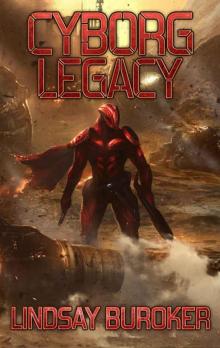 Cyborg Legacy: A Fallen Empire Novel
Cyborg Legacy: A Fallen Empire Novel The Swords & Salt Collection
The Swords & Salt Collection Blood and Betrayal ee-5
Blood and Betrayal ee-5 The assassin curse
The assassin curse Warrior Mage (Book 1)
Warrior Mage (Book 1) Forged in Blood II ee-7
Forged in Blood II ee-7 Relic of Sorrows: Fallen Empire, Book 4
Relic of Sorrows: Fallen Empire, Book 4 Deadly Games ee-3
Deadly Games ee-3 Elven Fury (Agents of the Crown Book 4)
Elven Fury (Agents of the Crown Book 4) Torrent rar-1
Torrent rar-1